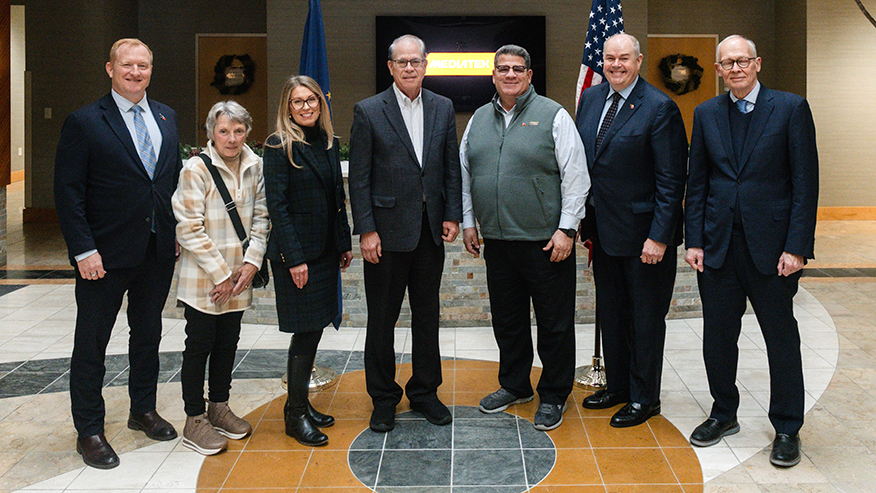Biotech company Eradivir is developing lead drug EV25 to treat influenza
Company has completed the required preclinical studies and will seek regulatory approval to dose volunteers in Belgium by the end of the year

Eradivir, a preclinical biotech company, has successfully completed studies required by regulatory agencies to dose EV25 in humans. EV25 is the company’s lead drug that treats influenza. (Photo/iStock.com photo/sitox)
WEST LAFAYETTE, Ind. —
Eradivir, a preclinical biotech company, leverages small molecule targeting technology developed in Philip Low’s lab at Purdue University to focus on a platform of immunotherapies for viral infections like influenza and other diseases.
CEO Martin Low said Eradivir’s lead drug EV25 treats influenza, a disease that affects up to 40 million Americans, kills between 10,000 and 50,000, and hospitalizes 150,000 to 750,000 annually.
“EV25 relies on a U.S. Food and Drug Administration-approved drug as a basis to deliver an attached immunogenic payload containing haptens, specifically to the surface of virus and virus-infected cells,” Martin Low (rhymes with “now”) said. “As a result, EV25 both inhibits viral reproduction and kills the flu virus and infected cells.”
Martin Low said EV25 has demonstrated several advantages over current influenza drugs.
“It promotes a quicker recovery even after delaying treatment well beyond the standard 48 hours from the appearance of symptoms,” he said. “It also reduces both the risk of drug resistance and the number of doses required to only one.”
Developmental steps
Eradivir has successfully completed preclinical studies required by regulatory agencies to dose EV25 in humans.
“A Phase I study, designed to indicate the safety of EV25 in healthy volunteers, is scheduled to begin in Antwerp, Belgium, at the end of the year,” Martin Low said. “Also planned for 2025 are two Phase II studies that will confirm safety and indicate the efficacy of EV25.”
Martin Low said because Eradivir’s overall immunological technology platform has the potential to treat multiple diseases, the company is also conducting studies on other molecules to treat dengue and RSV, or respiratory syncytial virus.
“We have seen some early success and hope to demonstrate proof of concept for one of these molecules by the end of the year,” he said.
Eradivir leadership
Eradivir’s team has been very successful in developing small molecule therapies in cancer, autoimmune diseases and infectious diseases. Its board members include Philip Low and Raymond Schinazi, who have worked on several drugs that have been approved for the market.
“We have built a team that understands viruses and how to develop small molecules. Many of us have worked together in the past and know how to get things done,” Martin Low said.
Eradivir’s Purdue University connections
Philip Low is Purdue’s Presidential Scholar for Drug Discovery and the Ralph C. Corley Distinguished Professor of Chemistry in the College of Science. He also is on the faculty of the Purdue Institute for Drug Discovery and the Purdue Institute for Cancer Research. He has started seven successful companies based on his research, and three of his drugs have been approved by the FDA.
“It is our goal to continue our discovery work in these areas at Purdue University,” Martin Low said. “Our investors share this vision and have to date contributed over $18 million in financing.”
Philip Low disclosed the immunological technology innovations to the Purdue Innovates Office of Technology Commercialization, which has applied for a patent to protect the intellectual property. OTC licensed the innovations to Eradivir for further development and commercialization.
About Eradivir
Eradivir’s goal is to focus the power of the immune system to treat disease. Its small-molecule, bispecific immunotherapy tethers a patient’s immune cells specifically to a diseased cell facilitating its rapid and selective destruction. Its first drug to go into humans, EV25, is directed against influenza.
About Purdue Innovates Office of Technology Commercialization
The Purdue Innovates Office of Technology Commercialization operates one of the most comprehensive technology transfer programs among leading research universities in the U.S. Services provided by this office support the economic development initiatives of Purdue University and benefit the university’s academic activities through commercializing, licensing and protecting Purdue intellectual property. In fiscal year 2023, the office reported 150 deals finalized with 203 technologies signed, 400 disclosures received and 218 issued U.S. patents. The office is managed by the Purdue Research Foundation, which received the 2019 Innovation & Economic Prosperity Universities Award for Place from the Association of Public and Land-grant Universities. In 2020, IPWatchdog Institute ranked Purdue third nationally in startup creation and in the top 20 for patents. The Purdue Research Foundation is a private, nonprofit foundation created to advance the mission of Purdue University. Contact otcip@prf.org for more information.
Writer/Media contact: Steve Martin, sgmartin@prf.org
Source: Martin Low, martin.low@eradivir.com



